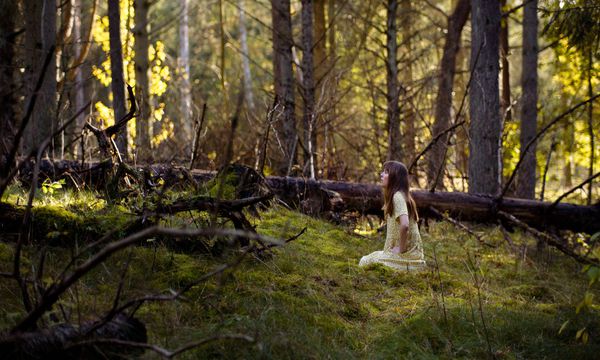 |
| Annette K Olesen on Sofie Juul Blikenberg as Maja in A Matter of Trust: “I have never directed a character that in that sense was somehow purely naïve or open. Photo: Anders Nydam |
Annette K Olesen’s A Matter Of Trust (Ingen Kender Dagen), co-written with Maren Louise Käehne, based on the stories by Carsten Jensen, Niels Henning Krag Jensby, Kamilla Hega Holst, Martin Kongstad, and Caroline Albertine Minor, and edited by Dennis Göl Bertelsen is a highlight of the 21st edition of the Tribeca Film Festival. Trine Dyrholm (Charlotte Sieling’s Margrete: Queen Of The North, Susanna Nicchiarelli's Nico, 1988) heads a remarkable ensemble cast that includes Emil Aron Dolph, Anders Brink Madsen, Ellen Rovsing Krudson, Morten Hee Andersen, Jakob Cedergren, Ellaha Lack, Lisbet Dahl, Ene Øster Bendtsen, and Sofie Juul Blinkenberg.
 |
| Annette K Olesen with Anne-Katrin Titze on filming where Hans Christian Andersen is from: “We did that to be surrounded by that fairy-tale landscape as well.” |
Five stories, written independently by five different Danish authors, with some obstructions in place, intertwine into a fascinating snapshot of the state of trust in the state of Denmark during one day in the present. Each storyline stands on its own, but only together do they unfold their thought-provoking power.
The different tones and moods give the movie the feel of real life, with each of us on our separate journey through the day. It is precisely the lack of a cinematic contrivance to overlap the stories, that makes the result magical. Trust, we learn, is something to pay much more attention to than most of us do. The erosion of it, because of the way the world is going, will be everyone’s downfall.
From Copenhagen, Annette K Olesen joined me on Zoom for an in-depth conversation on A Matter Of Trust.
Anne-Katrin Titze: Hi!
Annette K Olesen: Thank you very much for meeting me.
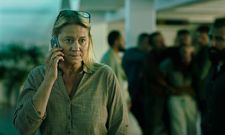 |
| Annette K Olesen on Trine Dyrholm as Eva: “Trine’s story has so much to do with her trusting the policy makers …” Photo: Anders Nydam |
AKT: My pleasure. Where are you?
AKO: I’m actually at the National Film School in Copenhagen. A good old colleague of mine who thirty years ago started up a documentary department at the film school is leaving now for his pension.
AKT: So the retirement party! What’s the colleague’s name?
AKO: He is withdrawing but he’s going to teach on and off but he is not going to be the head of the department anymore. His name is Arne Bro. He educated people like Jonas Rasmussen, Janus Metz, and other great filmmakers. So he is being celebrated.
AKT: And you are interrupting your celebration for a conversation about A Matter of Trust.
AKO: Of course I am!
AKT: I found it so interesting, especially after having watched the film, that you start it with a Lenin quote: “Trust is good but control is better.” Tell me about how trust as the central issue came about!
AKO: Well, the Lenin quote came on a bit further on than the idea. Later it felt more and more essential to put it that square and to use the Lenin quote to start the erosion in people’s minds before they see the film. The idea came along six, seven, eight years ago. I read about a Danish economist, a professor of economy who worked with North American colleagues and the had a project together. They came to Denmark and visited the country and said - I haven’t spoken to them, so maybe I’m just inventing.
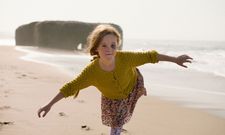 |
| Annette K Olesen on Ellen Rovsing Knudsen as Laura: “We kept wanting to balance the mother character so that you are constantly in doubt.” Photo: Anders Nydam |
AKT: The dialogue - probably.
AKO: So they said to him “You don’t have any oil, you don’t have any diamonds. You have bacon and windmills. How come you’re so rich in this country? How come you have such a great welfare system? How come people feel so safe?” We kept bouncing between 1, 2, and 3 on the happiness scale for years in that epoch. I don’t know where we are now. They asked where does all that come from? He joked about it but then said “I’m going to find out and he gathered a team of other scientists and historians, anthropologists, political and social scientists. They worked for years and came back and said; we live off trust.
He is claiming that a big part of our gross national product is based on what he calls trust economy. It’s quite banal, it’s based on the fact that you trust each other. You don’t need everything written down on a piece of paper, when you and I say we have a deal, we have a deal. With a society like that you don’t need so much control. And you don’t have a lot of corruption.
AKT: A moment in your film that beautifully encapsulates this is the scene in the forest when Maja runs away from the funeral and finds a stand where she gets a French hot dog. There’s a little exchange with a person we don’t see and money changes hands in an unusual way. This is the trust economy in a nutshell.
AKO: Also the stall that Adam passes by the road, that says Only Cash. That’s still very normal in Denmark that farmers put their grocery by the road and you leave whatever it says you have to leave just in a box and you go.
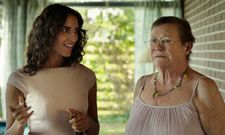 |
| Vian (Ellaha Lack) tries to mislead Hanne (Lisbet Dahl) Photo: Anders Nydam |
AKT: I know it from Germany and France. Fields of Gladioli, that you cut yourself and then put the money in a box. Or even in Switzerland in cafés they had delicious little sandwiches in baskets on the tables - I don’t know how it is now with Covid - and then they’d ask you later how many you’ve had when you pay for your coffee. In America that would not happen.
AKO: Exactly. There was actually some very interesting court case in the US with a young Danish woman who came there with her husband or boyfriend and they left their baby carriage outside a café. She was inside behind the glass watching the carriage but she was arrested for leaving her baby on the street. Everyone does that in Copenhagen and all of Denmark. When I started reading about that, one of our biggest banks in Denmark was involved in a big whitewashing scandal.
Then there was a lawful demonstration on the streets in Copenhagen where the police suddenly attacked the demonstration and took away some Tibetan flags from the demonstrators. A Chinese official was in the country and someone decided we don’t want to offend the Chinese. Little things started happening. A politician who suddenly was accused of taking public money and I just started talking to Maren Louise [Käehne] about what is happening. Because in all this is the trust that we place in each other, in our policy makers, in our institutions. If this guy, the economist, is right and it is our national resource, then we should maybe start talking about what trust is.
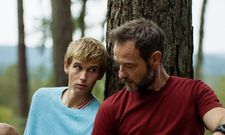 |
| Emil (Emil Aron Dorph) with his teacher Henrik (Anders Brink Madsen) Photo: Anders Nydam |
AKT: Precisely! And your film does that.
AKO: Then came the whole script process which was very interesting because we involved five very acclaimed Danish literary writers to deliver each a story. We wanted to kick ourselves in the kidneys and see what comes out if we don’t give birth to the initial stories ourselves. We would trust these writers to deliver short stories where they were only given three conditions. To be about trust and whirl around that theme any way they wanted. It had to take place in Denmark and it had to take place within 24 hours. The last two conditions were there because I knew I wanted to make this film very cheaply.
AKT: When did you give them the assignment? Was it pre-Covid?
AKO: Yes it was pre-Covid and Maren Louise, the screenwriter, and I we were tapping our fingers waiting for these stories, it was very nervy. When the five stories came back it was amazing.
AKT: I love that you start with Trine Dyrholm’s story. Actually with her face. I spoke with her twice, about The Queen Of The North and Nico, 1988 and it’s always a pleasure to see her. In this case, the trip her character is taking holds a mirror to all the other stories. Do you see that as well?
 |
| Jakob Cedergren as Adam, poolside Photo: Anders Nydam |
AKO: I certainly do. Our ambition was almost to put trust under a microscope, like a scientist. We learned the primary condition for trust between people in a society is that people trust their institutions, policy makers, administrators of our tax money, the banking system. Trine’s story has so much to do with her trusting the policy makers, the politicians, this decision to repatriate people to a country that they don’t want to go back to. Her being on that plane is her practicing trust in the policy makers of this country. In this sense, the whole film became wrapped in the State.
AKT: The ending when she drives back and we are in her head, we may anticipate loneliness. But no, the ending is quite optimistic. There was Claire Simon’s I Want To Talk About Duras in the ">New York Film Festival on Marguerite Duras [and Yann Andréa], where a journalist [played by Emmanuelle Devos] interviews her lover. We also expect loneliness, which is not the case. The possibility of community is beautiful at the end of your film.
AKO: I’m really happy you get that. Because that ending has been in and out of the film so many times. We decided she needs to be united with the people she trusts. There needs to be the sense that tomorrow there’s a new day.
AKT: The relationships depicted in these five stories need a basis in trust. A mother and daughter on the beach, the little girl has a black eye, something is off here. An other one is teacher-student.
 |
| Morten Hee Andersen and Trine Dyrholm in Charlotte Sieling’s Margrete: Queen Of The North |
AKO: Wife-husband.
AKT: Absolutely, and with her pregnant. And then there is the affair story which is actually the most surprising and amusing, with the structuring by three interruptions. How did you work on braiding it all together?
AKO: We experimented combining such different genres. How do you go from the horror and the tragedy on the airplane to la-di-da in a rented house with a mistress? We know all the tricks of the multi-plot stories. A weather condition, or they hear the same radio program or we discover that they belong to the same family, or whatever. We tried all the tricks and then said why don’t we just try the 24 hours of the clock? When Trine has to go to Afghanistan and back, she needs to leave at 5 o’clock in the morning and she’ll be back at 11 o’clock in the evening. A funeral in Denmark only starts at 1 or 2 in the afternoon. So the married couple, we only meet them when the school day is over. Once we started building it that way it became somehow organic.
AKT: It feels very organic. I only noticed two moments where there was a segue. The piece of amber and the name Amber, whose funeral it is. The other one is that the couple and the teacher and student cross paths in the forest.
AKO: It comes from the original short stories. We decided to respect the tone and the characters we were given from the authors. It was so interesting to submit to what we were given.
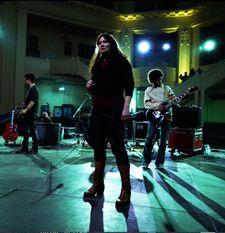 |
| Trine Dyrholm as Christa Päffgen aka Nico in Susanna Nicchiarelli’s Nico, 1988 |
AKT: And to counter Lenin and give up control. Another performance I found spectacular is by the actress who plays Maja, Sofie Juul Blinkenberg. I loved her poetic performance.
AKO: Oh I’m so happy you say that. I really love her as well. I have never directed a character that in that sense was somehow purely naïve or open.
AKT: Purely pure.
AKO: Purely pure! Sofie certainly is not naïve as an actress and a person. The question of that story is, do you need to know everything about the one you love? Do you need to know everything about this person’s past to be able to trust this person?
AKT: The Bluebeard question, are there skeletons?
AKO: Exactly. And she decides not to know, which I think is the biggest gift you can give to anyone. Some of the audience think, oh she’s in danger. It’s clear that he’s affected by whatever happened in the past but he never did anything to harm her.
AKT: She is trusting her instincts there, after her return to the forest. I keep coming back to fairy-tale elements not just because it’s a specialty of mine. The house the mother and daughter end up in has a feel of great danger. The mention of the bath gives you chills. That segment must have been tricky in what to tell us, what not to tell us.
AKO: Exactly. These two authors, the one who wrote the story of Maja, the pregnant woman, Caroline Albertine Minor, and the one who wrote the story about the mother and the daughter - the mystery was actually in the story. The Maja story was a very physical story: him disappearing all the time, her feeling dizzy, needing to go to the bathroom, feeling hungry all the time. Sofie and I spoke so much about this physical condition that she’s in. Also, we placed this story, I know this is very nerdy, in Funen, where HC Andersen is from. So when you say fairy tale …
 |
| Tribeca Festival at Spring Studios Photo: Anne-Katrin Titze |
AKT: H.C.! Good old HC!
AKO: We did that to be surrounded by that fairy-tale landscape as well.
AKT: And the mother-daughter story?
AKO: Kamilla Hega Holst is the author of that one. She has that scary psychological uncertainty in a lot of her stories. They often take place between children and their parents and have that psychological, almost horror feel to them. We spoke a lot, the screenwriter and the woman who plays the mother that anyone who has been a mother knows that we’re not always perfect. Of course something happened in this story but we wanted to keep it open how fatal.
AKT: How deep into the danger it really goes. At the end of Hansel and Gretel, we know the witch was in the oven and upon their return the stepmother had mysteriously died, because maybe they were one and the same all along. The mother-ness and witch-ness are both in that character in your film.
AKO: Wow, I’m happy you see that. We kept wanting to balance the mother character so that you are constantly in doubt. Has she gone absolutely crazy, is she going to kill her child, or is she desperately longing to be with her?
AKT: Probably both, which is most scary. It’s funny, the strand about the unfaithful by the pool in the rented house - other people would make a whole film just out of this one story and here it’s the comic relief! I really like how you combined these very different stories. Say hi to Trine from me!
AKO: She’s coming to New York with us! And the guy who plays Adam [Jakob Cedergren]. So we’re going to roam around!
AKT: Maybe I’ll see you there and we can catch up at the festival!
AKO: That would be very nice! Thank you so much!
A Matter Of Trust screens on Tuesday, June 14 at 8:15pm - Village East by Angelika: Theater 7; Thursday, June 16 at 5:30pm - Cinépolis: Theater 4; Thursday, June 16 at 6:00pm - At Home; Friday, June 17 at 5:15pm - Tribeca Film Center. Annette K Olesen, Maren Louise Käehne, Trine Dyrholm, and Jakob Cedergren will participate in Q&As following the three cinema screenings.
The Tribeca Film Festival runs through June 19.





















